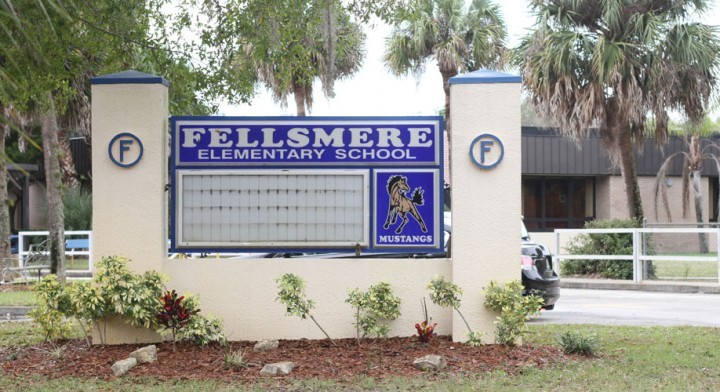
INDIAN RIVER COUNTY — The School Board, for reasons that have never been made clear, has been considering converting the two county schools with the largest minority enrollment – Fellsmere and Dodgertown elementary – into charter schools without ever involving the schools’ principals, teachers or parents in any such discussions.
Under this scenario, which two of the five School Board members appear to favor, the School District rather than a private entity would still operate the schools, but they would be treated as charter schools and no longer as one of the other 10 public elementary schools in Indian River County.
Creating a district-run charter school would be permitted under a proposal being pitched by Gov. Rick Scott. Just what the benefit of such a conversion would be – either to pupils or to the School District – remains unclear.
Neither School Board Chairwoman Carol Johnson, who has repeatedly floated this idea for several years, nor School Board member Claudia Jimenez, who appears to favor it, has clearly explained what the switch would accomplish or how it would work.
Even though the idea was publicly discussed again as recently as last week at a “roundtable” meeting, Fellsmere Elementary Principal Ramón Echeverría said he hadn’t heard anything from the School District about the idea of converting his school into a charter.
“I have no clue how I feel,” he said.
Fellsmere, which slipped from an “A” to a “B” this past school year, has strong family involvement, despite its large percentage of migrant agricultural workers and students who enter the school speaking only Spanish.
Fellsmere Elementary is a unique school in that it is 90 percent minority, including 86.8 percent Hispanic, the largest concentration of Hispanic students out of all the district’s traditional schools.
The next highest minority population of an Indian River County School is Dodgertown, with 68 percent minority, including 36.5 percent Hispanic and 28.8 percent African-American.
Dodgertown’s grade from the state slipped from a “B” to a “C” in the last cycle.
Superintendent Fran Adams said the discussion regarding converting any schools to charters was simply that – discussion.
The “roundtable” sessions of the School Board are open to the public, but few attend and they are not televised.
Adams expressed regret the names of the two schools were reported by VeroNews.com in an article that was published following the roundtable meeting last week.
“It causes anxiety,” she said.
She confirmed that the district never talked to Fellsmere or Dodgertown’s principals about the discussion, and said there was “no plan to do that.”
She explained the board was just exploring the idea.
“She threw an idea on the table,” Adams said of Johnson.
“We’re not picking on any schools,” Johnson said.
Converting Fellsmere to a charter would protect the school, Johnson said, explaining that it no longer would have to be concerned about a possible challenge to the diversity of its enrollment.
She said Hispanics are the largest minority in the county, and making Fellsmere a charter would serve that population well.
Johnson said she was concerned that a group such as the American Civil Liberties Union might challenge its high minority enrollment, leading to litigation and busing of students.
Echevarría said he wasn’t aware of any concern about diversity at his school.
“There is no foundation,” he said.
As for Dodgertown Elementary, Johnson said the district needs to increase enrollment, which has been sliding so badly that the School Board last year considered sending the school’s students elsewhere and freeing the campus up for Osceola Magnet.
“We’re losing the identity of our community,” Johnson said. Dodgertown originally opened as Clemmons Elementary but was renamed when the Los Angeles Dodgers baseball team moved to Vero Beach and adopted the school.
Johnson said the Dodgers not only provided an identity for the school, but also financial support that left when the Dodgers departed from Vero.
As a charter school, the district would have the flexibility to offer innovative programs to entice students to Dodgertown, she said, suggesting it “might be ripe for dual language” teaching in both English and Spanish.
She cited a school in Orlando that offers classes in Vietnamese to that ethnic population.
Of the 17,820 students who attend schools within Indian River County’s district, 2,047 or 11.5 percent opt for charters. The charter population within the district is 69.8 percent white, 16.7 percent Hispanic and 8.9 percent African-American. By comparison, the district’s traditional school enrollment (including magnet schools) is 56.2 percent white, 21.5 percent Hispanic, and 17.3 percent African- American.
So what are the alternatives to conversion charters? That’s unclear.
Adams is quick to point out that staff is in the exploratory stage – that nothing has been decided and won’t be decided unless and until the School Board votes on it.
She said options could include using “turnaround models,” establishing more magnet schools – like Rosewood, Osceola and Liberty – and providing focus areas. Perhaps part or all of the leadership of some schools would be changed as part of a turnaround plan, she said.
“Actually, other ideas may be brought forward as we research various models,” she said in an e-mail, adding that several questions would need to be answered before action could occur. Such questions include: ‘What is the purpose for a change, what are our intended results, what would it look like, what challenges might occur, what have we learned from similar situations and what will make us successful this time,’” Adams wrote.
“It is a process and it would be premature to discuss where,” she added.



